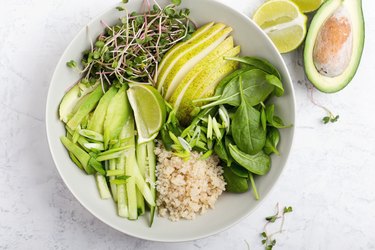
Knowing which foods are acidic and which ones are basic will come in handy when you're canning. If you're looking for an alkaline diet plan, however, you're better off focusing on a healthy, well-rounded diet.
Are Basic Foods Best?
Video of the Day
Proponents of the alkaline diet say it helps to lose weight and possibly fight cancer. That may be true, but not for the reasons you think, according to the MD Anderson Cancer Center at the University of Texas.
Video of the Day
Basic foods are more alkaline in nature. The pH scale, which goes from 7 to 14, measures whether something is acidic or basic. Acidic compounds are on the lower end of the scale. Basic compounds, which are more alkaline, range between 7 and 14 on the scale. Human blood is typically between 7.3 and 7.4, according to UC San Diego Health.
The alkaline diet, which is based on the idea that eating alkaline foods makes your body less prone to cancer, hasn't been proven, points out the MD Anderson Center. These claims are based on studies of cells grown in the lab, not on human cells. The tumors in the human body are far more complex than artificial cells.
The basic foods found in an alkaline diet include some fruits, vegetables and lots of water. The diet does promote healthy eating patterns, states the MD Anderson Center. Along with fruits, vegetables and hydration, it requires cutting back on sugar, alcohol, meat and processed foods.
Read more: List of High Alkaline Vegetables
Foods on the pH Scale
The food you eat doesn't affect the pH of your blood, according to the Health Science Center at Texas A&M University. Your body maintains a neutral pH of about 7.4 from natural bodily functions, like breathing and urinating. The alkaline diet recommends limiting protein, but Texas A&M reports that healthy proteins are necessary for muscle growth and weight loss. Plus, these nutrients help your body excrete acid through urine.
Most fruits and vegetables tend to be base food items, which means they're above 7 on the pH scale, according to the International Food Information Council Foundation. Plant-based proteins fall into this category too.
Meats, according to Oklahoma State University's Food Technology Fact Sheet, tend to be acidic. So is most fish and seafood. Dairy products range mostly from 4 to 6.5, although milk can be as high as 7.3, which means it's less acidic. If you want to eat more plant-based foods and less meat, dairy and processed foods, however, you should do it because these are healthy foods, not because they will make your body less acidic.
Alkaline water is usually no better than plain water, according to the Mayo Clinic. The MD Anderson Center adds that most alkaline waters are bottled mineral water that will neither help or harm you.
Here are the pH values of some common foods, according to Oklahoma State:
- Apples (red delicious): 3.9
- Bananas: 4.5 to 5.2
- Strawberries: 3.0 to 3.5
- Oranges: 3.1 to 4.1
- Ground beef: 5.1 to 6.2
- Roast turkey: 5.7 to 6.8
- Chicken: 6.5 to 6.7
- Freshwater fish: 6.6 to 6.8
- Tuna fish: 5.2 to 6.1
- Milk: 6.2 to 7.3
- Butter: 6.1 to 6.4
- Bread: 5.3 to 5.8
Read more: Acid Vs. Alkaline in the Body
Alkaline Diet Supports Kidney Health
There is one type of health problem that can be helped by an alkaline diet, and that's kidney disease. While there is limited evidence on the alkaline diet in general, a study in the May 2017 issue of the Journal of Renal Nutrition concluded that a more alkaline diet may benefit patients with chronic kidney disease.
Many of the foods recommended on this scale are fruits and veggies, including green leafy vegetables, brussels sprouts, cabbage, onion, garlic, lettuce, cucumber, radish, zucchini, celery and arugula. The study authors recommend kidney disease sufferers to eat two to three servings of these foods each day.
Other vegetables like corn, peas, spinach, sorrel and beetroot increase the oxalate load, or the acidic load on the kidneys. So does rhubarb. Those with kidney disease should avoid foods that increase the oxalate load.
Kidney disease patients are also encouraged to limit high-potassium foods, and many alkaline foods are high in potassium. While the authors found that patients who ate a low-protein diet high in fruits and vegetables did better than those who didn't, you should check with your doctor for dietary advice.
Reach out to a medical professional before starting any diet. Eating a diet rich in fruits, vegetables, whole grains, nuts and seeds while cutting back on meat, processed foods and alcohol is something most people should strive for, the MD Anderson Center adds.
- Oklahoma State University: "The Importance of Food pH in Commercial Canning Operations"
- Texas A&M University Health Science Center: "Point of View: The Alkaline Diet: A Healthy Diet Backed by Faulty Science"
- MD Anderson Cancer Center, University of Texas: "The Alkaline Diet: What You Need to Know"
- UC San Diego Health: "pHear pHactor: Debunking the Alkaline Diet"
- Mayo Clinic: "Is Alkaline Water Better Than Plain Water?"
- Journal of Renal Nutrition: "Reducing the Dietary Acid Load: How a More Alkaline Diet Benefits Patients With Chronic Kidney Disease"
- International Food Information Council Foundation: "A 'Basic' Examination of the Alkaline Diet"